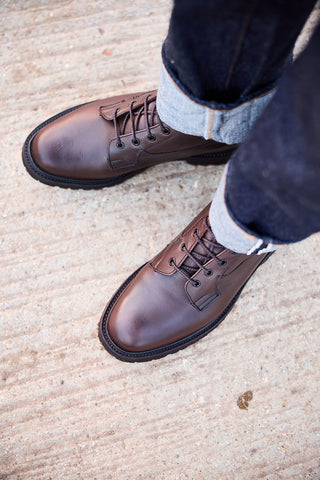
At Tricker’s, sustainability is woven into everything that we do. We have been working alongside world-renowned German tannery, Weinheimer, to develop the very best leathers for use in our Northampton-made footwear but it’s not just about the sustainability of our materials; it’s about ecological, economic and social sustainability as well.
Ecological Sustainabilty
The ingredients for a sustainable product should not only be harmless to the environment during production but ideally, also have a positive effect as well.
For our Olivvia Leather, the olive leaf extract is made from leaves that are a by-product of the food industry and are often burned. It is an entirely organic brew - it’s even edible - and therefore extremely clean. Finally, all of the waste from the process can be used as a natural fertiliser.

We also ensure that our shoes are easy to repair and renovate, meaning that fewer pairs contribute to landfill sites around the world. With fewer recycling centres around that can deal with shoe recycling, we must contribute to a greener future by providing other options.
ECONOMIC SUSTAINABILITY
When you find shoes that you love, you’ll want to keep them for as long as possible, so we only produce shoes that are built to last. Conserving and repairing, rather than simply buying something new and replacing, is at the heart of our manufacturing process, and when you purchase a Tricker’s shoe you have footwear that will stay with you for a long time.
Almost all elements of Tricker’s footwear can be repaired or replaced, and our Goodyear Welt construction means that it’s easy for us to do.
You can read more about our repairs and renovation here, and read our aftercare advice here to keep your shoes in great shape.

We also consider the wider economic impact that our materials have. When producing from some renewable raw materials, it can often mean that it has a knock-on effect, and the good intentions are undone down the line. Agricultural land used for sourcing materials may no longer be available for growing food, for example, so by using materials such as Olivvia leather which use ingredients that are already being produced anyway, it helps to lessen the negative economic impact and helps us build towards continued dedication to sustainable production processes.
SOCIAL SUSTAINABILITY
Whether it is appropriate that people have to labour under ignoble conditions when making a product is a question everyone needs to answer for themselves. Here at Tricker’s, we take great pride that we are 100% made in Northampton, using components sourced in the county where possible - such as our lasts which are made by Springline - and employing local craftsmen and factory operatives from the county.
We believe in training our staff in a trade, teaching them skills which will benefit not only themselves but their community and the country overall. A skilled workforce is the backbone of our economy, and we are committed to ensuring that the skills and quality that Tricker’s is renowned for is passed down through generations of our staff.

Where we source materials outside of our direct control, such as the Mediterranean regions, we also make sure that those we source from are fairly paid. In some regions, there have been new sources of income created from resources that we need, and we’re keen to encourage fair pay for all of our partners and suppliers.
WHAT NEXT?
We continue to do our best to improve our sustainability processes and procedures across all of Tricker’s, and we’re always looking at how we can do even better. We know that we won’t get it right every time, but we will continue to try to achieve the best outcome that we can.
If you’ve got any suggestions, we’re always happy to hear them, and we’re always open to new ideas and methods of working that could help us on our sustainability journey.
You can contact us on customerservices@trickers.com to speak with our team.


